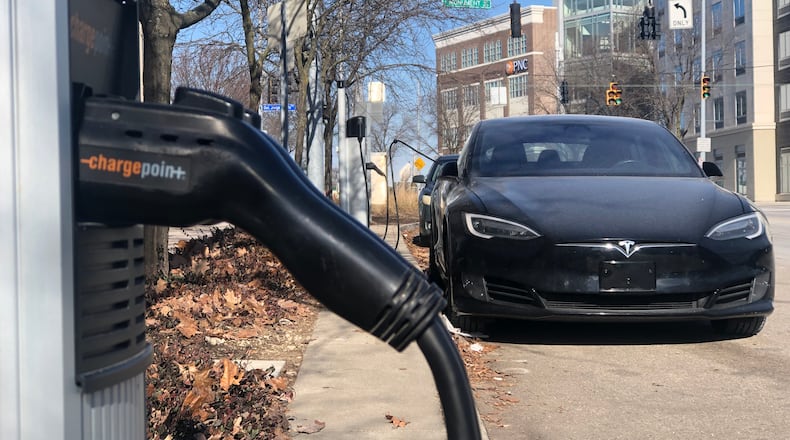“We’re definitely forging a new path,” said Meg Maloney, a sustainability specialist with the city.
The city has issued a request for proposals from vendors to add “level 2″ electric vehicle charger stations along city streets and in parking areas, including some near public facilities.
The RFP says the city is interested in new stations by or at City Hall, the Dayton International Airport, the city’s three recreation facilities, Kettering Field, the Oregon District garage and Welcome Park.
Other proposed locations include the Wright Dunbar Business District, Tech Town, the Fire Blocks District and Webster Station, near the Manhattan building.
The city already has charging units at the City Hall parking garage and a water department parking lot.
AES Ohio also helped install charging stations on Patterson Boulevard near Day Air Ballpark; a parking lot at Miami Valley Hospital; Sinclair Community College; and the University of Dayton.
Work is already underway to bring new charging stations to sites near the Dayton Metro Library, the Levitt Pavilion Dayton and the Oregon District.
Dayton is looking for a vendor that will own and operate new chargers, and the city says companies could install multiple stations at each location, if desired.
Infrastructure for new vehicle chargers can be expensive, and the city right now would like to see electric charging stations installed and operated at no cost to the city, city staff said.
Many charging stations cost electric vehicle users a certain fee per charge. The city plans to impose some sort of restrictions to prevent price gouging, Maloney said.
In the RFP, the city says it would like charging stations to be free for users at the Greater Dayton, Lohrey and Northwest recreation centers.
Credit: JIM NOELKER
Credit: JIM NOELKER
Maloney said there are many new incentives to install electric-vehicle charging equipment, including some from the federal Bipartisan Infrastructure Law and the Inflation Reduction Act.
“We’re trying to take advantage of all the money coming down,” she said.
Ohio is expected to get $140 million in federal funding over five years for electric vehicle charging stations along roads and highways from the Bipartisan Infrastructure Law.
Credit: JIM NOELKER
Credit: JIM NOELKER
Industry experts predict that more than half of passenger cars sold in this country will be electric vehicles by 2030, Maloney said.
“There’s definitely a big need for them (chargers),” Maloney said. “I feel like the city is being very proactive ... a lot more electric cars are being sold, and I really do believe it is like the chicken and the egg situation: If we have the chargers, people will come and use them.”
About the Author




